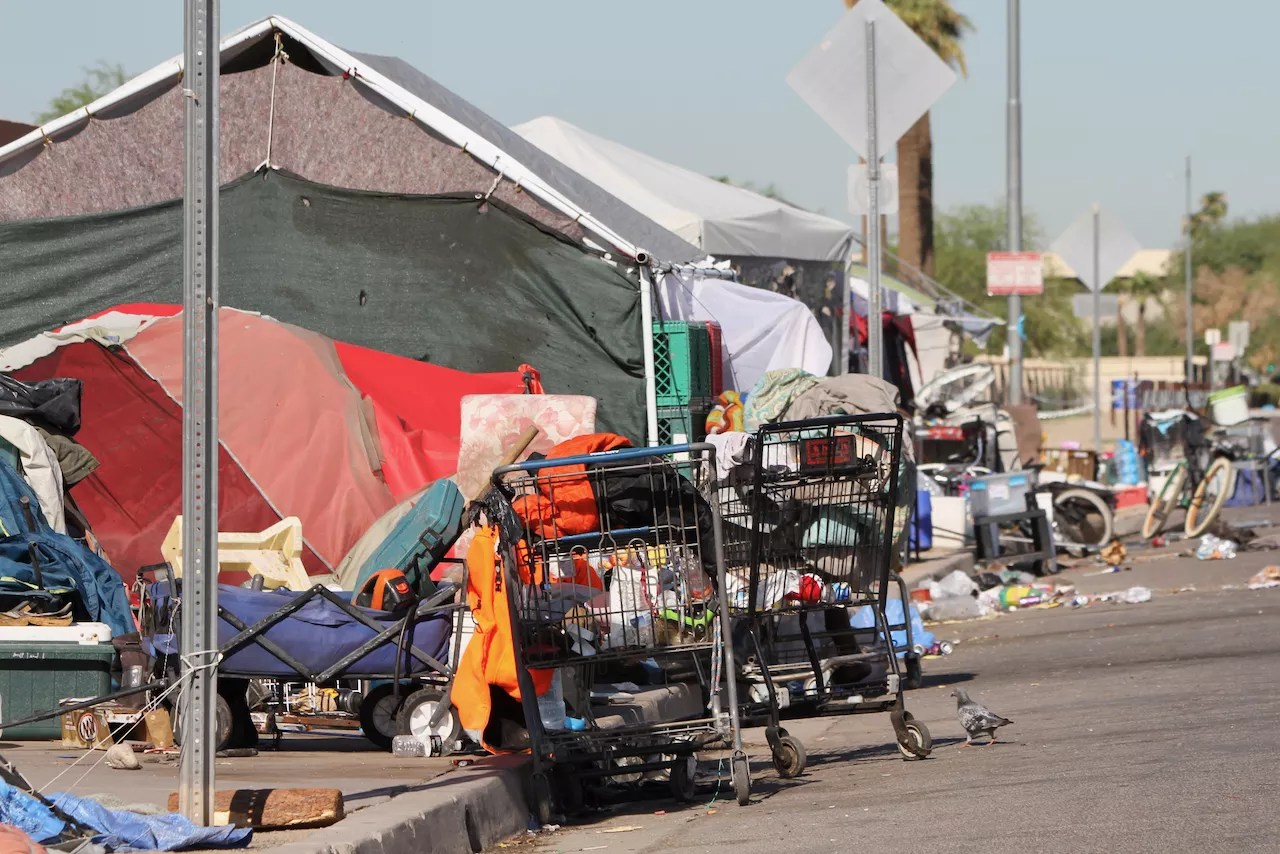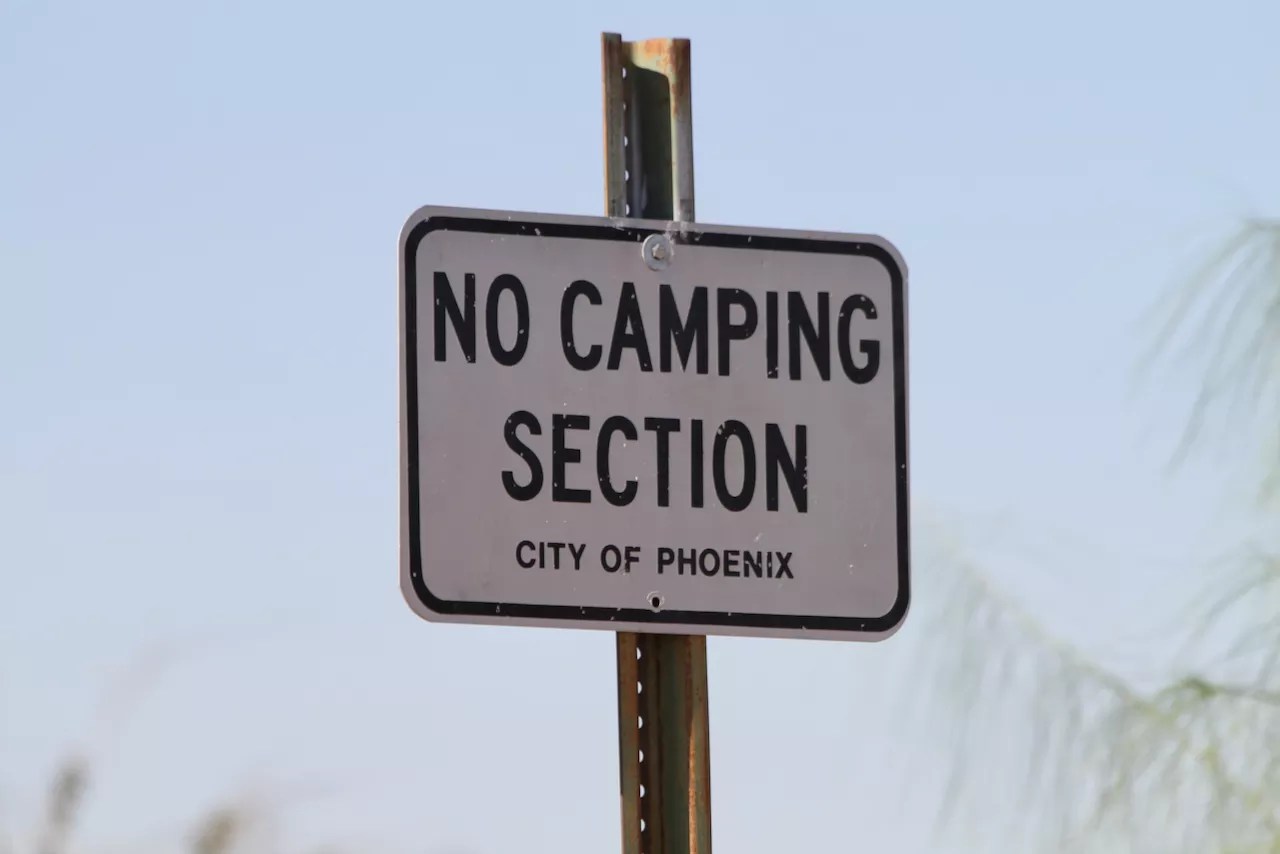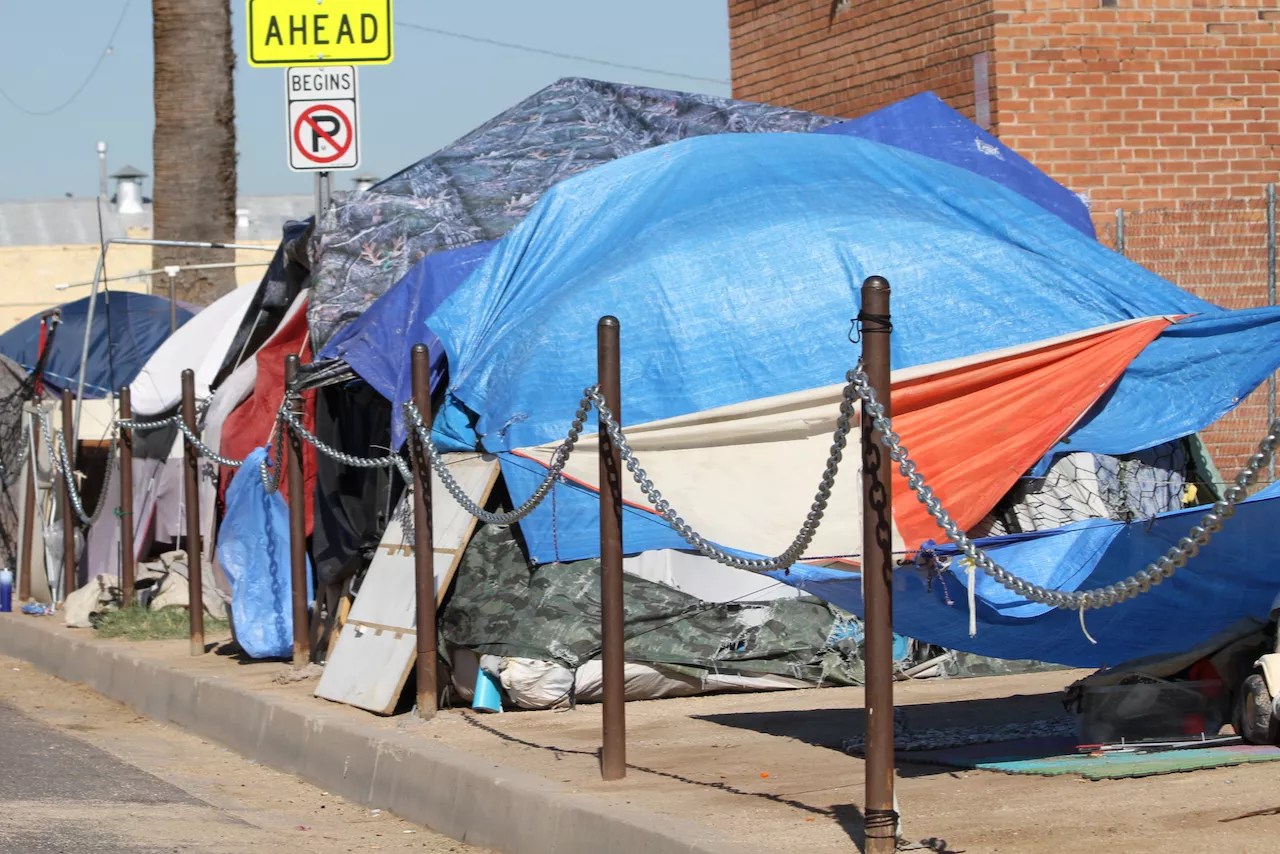
Matt Hennie

Audio By Carbonatix
Update: Read the latest coverage of the Zone.
****
The intensifying problem of homelessness in Phoenix is most visible in the Zone – a stretch of downtown along Jefferson Street between 9th and 13th avenues. There, tents and makeshift shelters line the sidewalks.
The number of people living in the Zone has grown to more than 1,000 in the last year, according to some estimates. People relocate to the area when the city clears their encampments elsewhere. Or when they are dumped there by local hospitals or the jails.
Now, the encampment is the subject of a new lawsuit by property owners in the neighborhood. The suit could force the city to take action – and potentially push officials to displace the entire encampment.
Local activists who work with the hundreds of people living in the Zone have long warned of the brutal conditions in the area. Toilets and running water are limited. Heat deaths are frequent.
Now they are worried that the lawsuit might only make conditions worse.
Attorneys representing 15 people who own properties in the vicinity of the encampment filed suit on August 10. The 57-page complaint called the encampment a “public nuisance” under Arizona law that has “irreparably harmed” those who have property or work in the area. Residents and business owners regularly suffer break-ins and have had to close businesses due to the expanding encampment, according to the suit.
“We are not seeking to send these unsheltered individuals to jail. That is not what this is about,” said Ilan Wurman, a law professor at the Sandra Day O’Connor College of Law at Arizona State University. Wurman partnered with Tully Bailey, a Phoenix law firm, on the suit.
Instead, Wurman said, residents want the city to take action after years of “completely abdicating its responsibility” in the neighborhood and address their concerns.
Dan Wilson, a spokesperson for the city of Phoenix, did not comment specifically on the lawsuit and instead pointed to the “complex issues” in the area. He also pointed to the city’s increased spending on housing issues.
“The city of Phoenix is committed to addressing the needs of all residents and property owners as we work with local and regional partners to address the complex issues surrounding those experiencing homelessness,” he said.
The city has until August 30 to respond to the lawsuit, though that deadline could be extended.

A lawsuit filed earlier this month criticized the city of Phoenix for failing to take action to address concerns over a growing homeless encampment.
Matt Hennie
Lawsuit: The Zone ‘Unsanitary and Unsafe’
The encampment downtown is larger than it has been in recent memory, but homeless people have lived there for decades. “There were a tremendous number of people sleeping in the area,” said Elizabeth Venable, an organizer with the Fund for Empowerment, an advocacy group that works in the Zone. Venable estimated that the numbers ranged from 400 to 500 people even years ago.
One possible reason for this is because several social services organizations are located at the center of the Zone. The Human Services Campus, a nonprofit resource hub, houses a 470-bed shelter run by Central Arizona Shelter Services and offers legal services, job programs, and housing assistance. Next door, Andre House provides free meals and other support for people living on the streets. “People come to where there are resources,” Venable said.
Something changed, however, in 2018. That year, a ruling in a case called Martin v. Boise affected how cities can treat encampments in several states, including Arizona.
In Martin, the Ninth U.S. Circuit Court of Appeals, which has jurisdiction over much of the western U.S., held that it was unconstitutional for cities to ticket people for sleeping or camping in public spaces if there were no shelter beds available and nowhere else for them to go. The ruling invalidated anti-camping ordinances in many cities.
In 2020, Phoenix New Times found that Phoenix had been slow to comply with the ruling. One homeless woman was issued a ticket for camping during the pandemic. Eventually, the city said it would stop issuing the citations.
Records bear this out. Back in January, New Times requested data from the city on the number of urban camping citations it had issued since 2017. They have fallen sharply. In 2017, Phoenix police issued 283 urban camping tickets. In 2018, that number decreased to to 172, and then again fell to 85 in 2019. In 2021, the city issued only nine.
Virtually every ticket issued since 2019 ultimately was dismissed by a municipal judge.
The lawsuit filed in early August argued that the city used the Martin v. Boise decision simply to neglect the Zone. That created a danger for the people who live there as well as the plaintiffs in the case, according to the suit.
“This is about the city of Phoenix using the Ninth Circuit decision as an excuse to completely wash its hands of the crisis,” Wurman said.
The 2018 decision doesn’t require or allow the city to maintain public land in an “unsanitary and unsafe condition,” according to the lawsuit. “Nothing in the Ninth Circuit opinion precludes the enforcement of laws and ordinances against public urination and defecation, drug use, and other disorderly conduct,” the suit stated.
But in the Zone, attorneys wrote in the lawsuit, “the city of Phoenix has ceased to enforce such laws and ordinances.”

A tent belonging to an unhoused person in Phoenix.
Matt Hennie
Homeless Activists Push Back
If the lawsuit is successful, here’s what could happen: First, a judge would declare the encampment in the Zone to be a “public nuisance,” as defined in Arizona law. “It is a nuisance. I would be shocked if we don’t win that issue,” Wurman said. Then, a judge could issue an injunction – a court order that would force the city to take action – and relocate the people currently living in the Zone, or otherwise address the nuisance.
“We’re not seeking damages,” Wurman explained. “We’re not seeking to overturn the Ninth Circuit decision.”
Wurman and the lawsuit suggested ways the city could solve the problem without violating Martin v. Boise. The city could move the encampment to another city lot and create a “structured camping space” that it maintains. Or, the city could provide enough shelter beds to resume enforcing its anti-camping ordinances.
Activists and people who have lived in the Zone have long been critical of the city’s approach to its largest encampment. A year ago, there weren’t bathrooms or running water with 24-hour availability. This spring, under mounting pressure, the city added a water station and 10 outdoor toilets.
They said the lawsuit may not bring solutions.
“The first time that I was homeless out here, it took a year and a half to even talk to someone at housing. And I was staying at [Central Arizona Shelter Services] at the time,” said Cappy Maatsch, another organizer with the Fund for Empowerment. Though she now has stable housing, Maatsch has spent stretches of time living in the Zone and nearby shelters.
Maatsch said she is worried that moving people away from the neighborhood could cut them off from needed resources that could only be accessed on-site. Venable agreed.
“I don’t see where they are supposed to go,” she said.
Both Maatsch and Venable don’t find the “structured camping” suggested by the lawsuit to be a good solution. Vacant city lots suggested in the lawsuit as an alternative location, they said, do not have access to the resources offered downtown. Sanctioned camping, as a policy, generally involves part- or full-time police supervision, which Venable argued is “like a jail” and not a shelter.
Stacey Champion, a longtime advocate for the homeless in Phoenix, shared these concerns. “We certainly aren’t going to police ourselves out of this situation,” she told New Times. “Especially when there is literally no place for many of these folks to go.”
When asked what he would tell advocates, Wurman said, “Our interests are aligned. We are not interested in criminalizing homelessness. We are interested in finding solutions to the problem.”

The owners of the Old Station Sub Shop on Jefferson Street are among the plaintiffs in a lawsuit over a nearby homeless encampment.
Matt Hennie
‘The Worst It Has Ever Been’
The lawsuit detailed the accounts of property and business owners in the area who have struggled with issues related to the Zone. The plaintiffs include the owners of the Old Station Sub Shop, a sandwich spot on Jefferson Street; the owner of PBF Manufacturing Company, a casket manufacturer a block over; and a couple who own a gallery on 11th Avenue.
Residents have had their windows smashed and cleaned up human feces from their lawns, the lawsuit said. Businesses have lost customers or shut down entirely, according to the suit, and some people can no longer access their property due to the tents lining the sidewalks. Photos throughout the lawsuit document trash covering sidewalks and police tape on street corners.
The plaintiffs, the attorneys argued, have been “harmed irreparably” by the situation in their neighborhood.
Venable pushed back on some claims in the lawsuit and said property owners should have considered the issues in the area before setting up shop. But some businesses have been in the Zone for decades.
Joseph and Deborah Faillace, plaintiffs in the lawsuit, have operated the sub shop since the 1980s. The situation in the area is “the worst it has ever been,” according to the lawsuit.
The fates of the Faillaces – and the 1,000-plus people living on the streets downtown – now rest in the hands of a Maricopa County Superior Court judge. An initial hearing is likely in the next few weeks, with a decision on an injunction possible as soon as this fall.